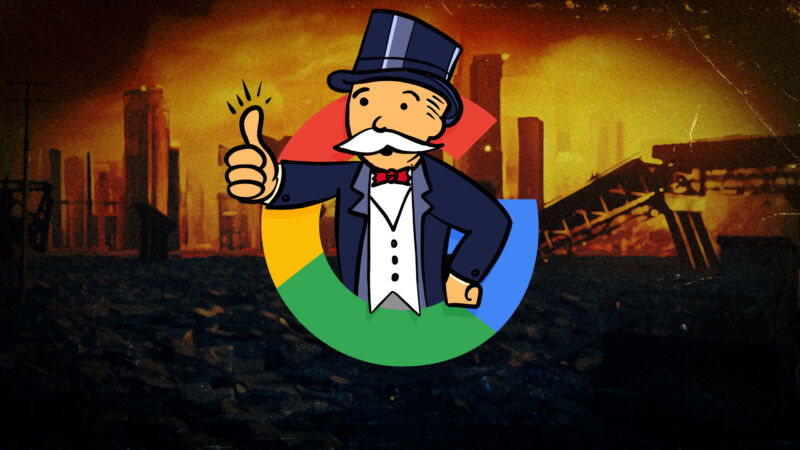
Aurich Lawson
As the US Department of Justice aims to break up Google's alleged ad tech monopoly, experts say that remedies sought in the antitrust trial could potentially benefit not just advertisers and publishers but also everyone targeted by ads online.
So far, the DOJ has argued that through acquisitions, Google allegedly monopolizes the ad server market, taking a substantial cut of every online ad sale by tying together products on the buyer and seller sides. Locking publishers into using its seller-side platform to access its large advertiser demand, Google also allegedly shut out rivals by pushing advertisers into a corner, then making it hard for publishers to switch platforms.
This scheme also allegedly set Google up to charge higher "monopoly" fees, the DOJ argued, allegedly putting some publishers out of business and raising costs for advertisers.
But while the harms to publishers and advertisers have been outlined at length, there's been less talk about the seemingly major consequences for consumers perhaps harmed by the alleged monopoly. Those harms include higher costs of goods, less privacy, and increasingly lower-quality ads that frequently bombard their screens with products nobody wants.
By overcharging by as much as 5 or 10 percent for online ads, Google allegedly placed a "Google tax" on the price of "everyday goods we buy," Tech Oversight's Sacha Haworth explained during a press briefing Thursday, where experts closely monitoring the trial shared insights.
"When it comes to lowering costs on families," Haworth said, "Google has overcharged advertisers and publishers by nearly $2 billion. That's just over the last four years. That has inflated the price of ads, it's increased the cost of doing business, and, of course, these costs get passed down to us when we buy things online."
But while it's unclear if destroying Google's alleged monopoly would pass on any savings to consumers, Elise Phillips, policy counsel focused on competition and privacy for Public Knowledge, outlined other benefits in the event of a DOJ win.
She suggested that Google's conduct has diminished innovation, which has "negatively" affected "the quality diversity and even relevancy of the advertisements that consumers tend to see."
Were Google's ad tech to be broken up and behavioral remedies sought, more competition might mean that consumers have more control over how their personal data is used in targeted advertising, Phillips suggested, and ultimately, lead to a future where everyone gets fed higher-quality ads.
That could happen if, instead of Google's ad model dominating the Internet, less invasive ad targeting models could become more widely adopted, experts suggested. That could enhance privacy and make online ads less terrible after The New York Times declared a "junk ad epidemic" last year.
The thinking goes that if small businesses and publishers benefited from potentially reduced costs, increased revenues, and more options, consumers might start seeing a wider, higher-quality range of ads online, experts suggested.
Better ad models "are already out there," Open Markets Institute policy analyst Karina Montoya said, such as "conceptual advertising" that uses signals that, unlike Google's targeting, don't rely on "gigantic, massive data sets that collect every single thing that we do in all of our devices and that don't ask for our consent."
But any emerging ad models are seemingly "crushed and flattened by this current dominant business model that's really arising" from Google's tight grip on the ad tech markets that the DOJ is targeting, Montoya said. Those include markets "for publisher ad servers, advertiser ad networks, and the ad exchanges that connect the two," Reuters reported.
At the furthest extreme, loosening Google's grip on the online ad industry could even "revolutionize the Internet," Haworth suggested.
One theory posits that if publishers' revenues increased, consumers would also benefit from more information potentially becoming available on the open web—as less content potentially gets stuck behind paywalls as desperate publishers seek ways to make up for lost ad revenue.
Montoya—who also is a reporter for the Center for Journalism & Liberty, which monitors how media outlets can thrive in today's digital economy—noted that publishers depending on reader funding through subscriptions or donations is not sustainable if society wants to "have an open in free market where everybody can access information that they deserve and have a right to access." By reducing Google's control, the DOJ argues that publishers would be more financially stable, and Montoya hopes the public is starting to understand how that could benefit the open web.
"The trial is really allowing the public to see a full display of Google's pattern of retaliatory behavior, really just to protect its monopoly power," Montoya sad. "This idea that innovation and ways to monetize journalistic content has to come only from Google is wrong and this is really their defense."